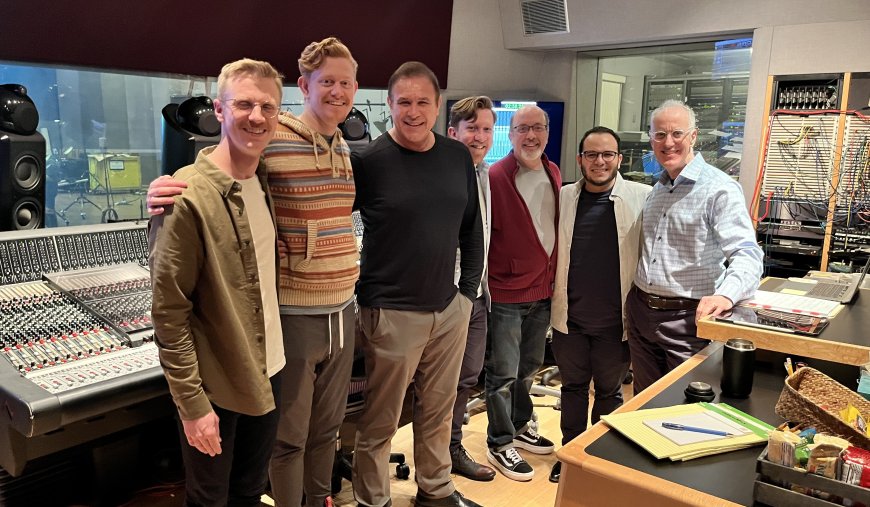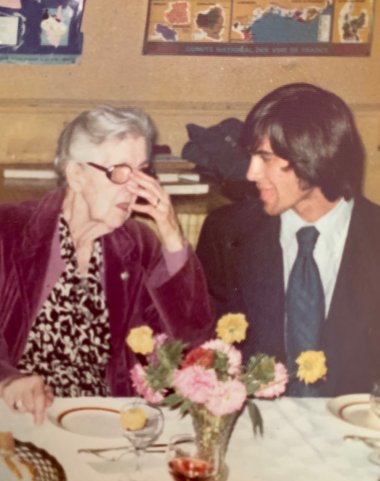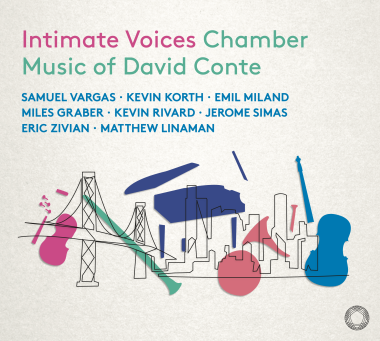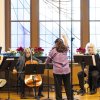
For composer David Conte, 2025 is proving to be a landmark year. Following performances of his music as far afield as Oxford University in England and Trinity Episcopal Parish Hall in Iowa, the Chair of the Composition Department at San Francisco Conservatory of Music has seen the release of his music on two recordings this year: ADAMS | BARBER | CONTE: Midsummer Light (Orchid Classics), on which the Royal Philharmonic Orchestra performs his Sinfonietta for Classical Orchestra, and Intimate Voices: Chamber Music of David Conte (Pentatone). The latter complements Albany Music's 2015 release, Chamber Music of David Conte, and features two superb Bay Area performers, cellist Emil Miland and pianist Miles Graber.

As one of the last students of the fabled French pedagogue Nadia Boulanger, Conte undoubtedly benefited from a teacher who consistently urged her students to focus on their innate gifts. As reflected in the five compositions on Intimate Voices, that gift is lyricism.
On the CD, however, you're left to search in vain for the natural air, resonance, and color palette that distinguish the best chamber music recordings. Undoubtedly this is due to the compiling efforts of four different producers and engineers who recorded in three different venues on five different dates — and the unnamed mastering engineer prioritized consistency of sound over everything else.
It's a shame, really, because so much is lost. Performers devote their lifetimes to deepening and enriching their color palettes and expressive ranges. We, in turn, deserve to hear it, especially on recordings of music as lyrically involved as Conte's. To hear what is missing, compare the sound of two other recently released chamber music recordings: Beethoven for Three, Vol. 4 from Kavakos-Ax-Ma and Shostakovich: The Complete String Quartets, Vol. 2 from Cuarteto Casals.
Nonetheless, Conte's gifts come through. Violinist Samuel Vargas and pianist Kevin Korth play touchingly on Elegy for Violin and Piano, the first of the disc's several elegiac movements. Aria and Fugue, which exists in six different arrangements that Conte composed and adapted for "various musical friends and colleagues," receives a fine performance from Miland and Graber. Miland's dark toned musicianship, distinguished by beautifully resonant low notes, stands out in this lovely lyrical duo.

The three-movement Sonata for French Horn and Piano, which Conte initially wrote as the Sonata for Double Bass and Piano, is here transcribed for Kevin Rivard, principal French horn in the San Francisco Opera Orchestra. The music allows Rivard and Korth to play all-out and enjoy themselves wholeheartedly in the process. I was especially captivated by the delightful final Allegro giocoso, the final virtuosic flourish of which gives Rivard ample opportunity to showcase the horn's lighter side.
The Sonata for Clarinet and Piano receives a definitive performance from Jerome Simas and Eric Zivian, who premiered its final revision with the Left Coast Ensemble in 2019. Another work that inspires repeated listening, its three movements conclude with a joyful Allegro.
With insufficient pause, the recording rather abruptly segues into the four contrasting movements of the Piano Trio No. 2, performed by Korth, Vargas, and Matthew Linaman. Here, Conte provides essential commentary that this major work's four successive movements were consciously inspired by four distinct musical personalities: Erich Korngold, Stephen Sondheim, Frank Martin, and one Ludwig van Beethoven. If you find yourself listening to Intimate Voices on repeat, don't be surprised if you hear me doing the same.




